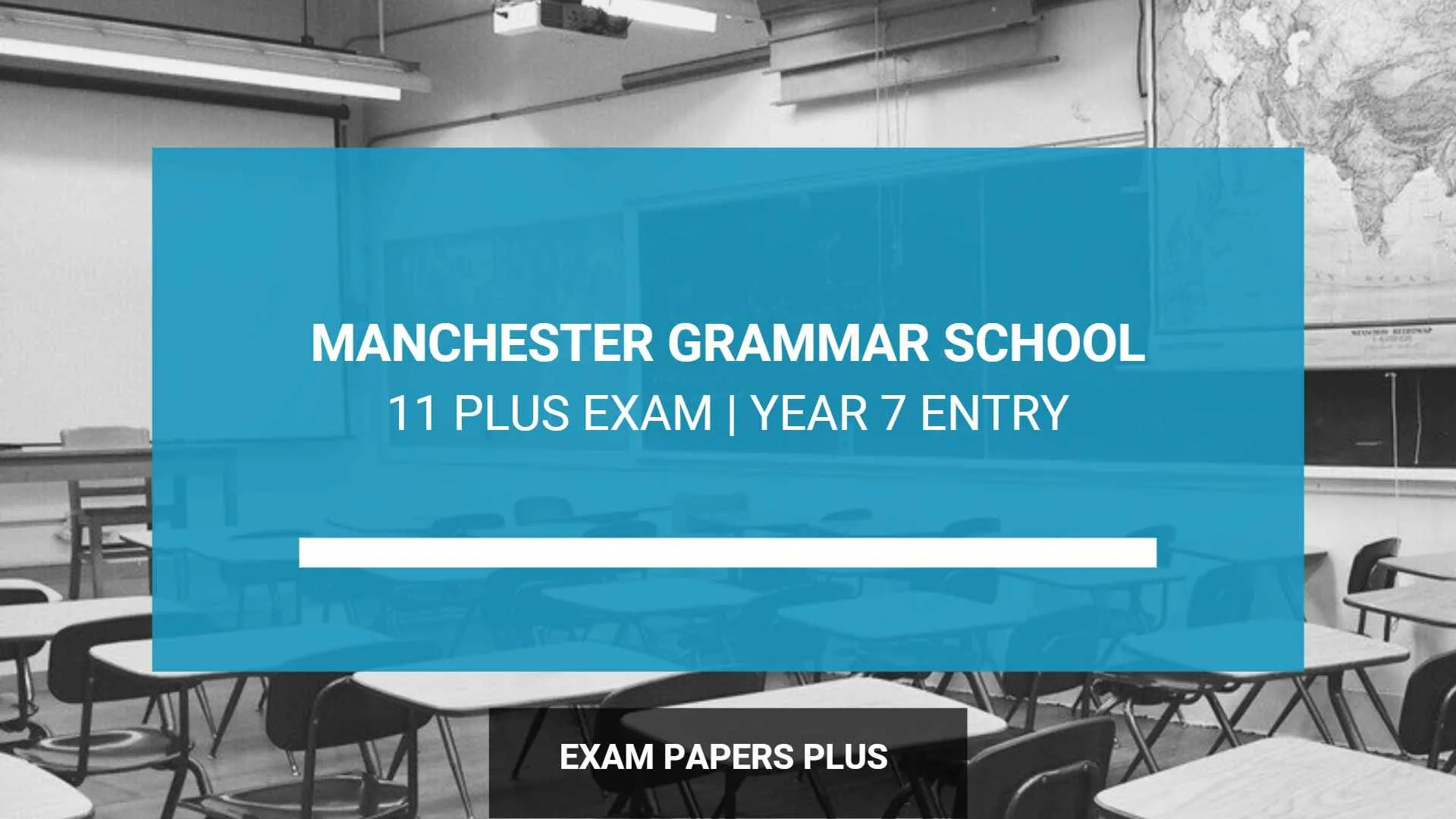Manchester Grammar School (MGS) – 11+ Practice Papers with Video Explanations
The Manchester Grammar School (MGS) is one of the most prestigious independent day schools for boys aged 7 to 18 in the UK. Located in Manchester, MGS is renowned for its academic excellence, university success, and a long tradition of producing leaders in all fields.
🏛️ History of the School
- Founded: 1515
- Founded by Hugh Oldham, Bishop of Exeter, with the aim of providing a free education to talented boys, regardless of background
- Originally located near Manchester Cathedral, MGS moved to its current site in Fallowfield in 1931
- Maintains its founding mission by offering substantial bursary support, helping ensure that ability—not wealth—is the key to admission
- One of the leading academic schools in the North of England for over 500 years
👨🎓 Pupil Numbers
- Total enrolment: Approximately 1,600 boys
- Junior School (Ages 7–11): ~250
- Senior School and Sixth Form (Ages 11–18): ~1,350
- Day school only – no boarding
- Highly selective entry, especially at 11+ and Sixth Form
🎓 Academic Reputation
MGS is consistently ranked among the top independent schools in the UK for academic results and Oxbridge success. It is particularly strong in Mathematics, Sciences, Languages, and Humanities.
📈 Recent Academic Results:
- GCSEs:
- ~90% of grades were 9–7 (A–A*)
- A-Levels:
- ~87% of grades were A–B*
- Regularly high performance in Maths, Further Maths, Physics, History, Economics, English, and Latin
🎓 University Destinations:
- MGS has one of the highest Oxbridge success rates outside the South East:
- Typically 30–40 students receive Oxbridge offers annually
- Most other pupils go on to Russell Group universities, such as:
- Imperial, UCL, LSE, Durham, Manchester, Edinburgh
- Strong support for Medicine, Engineering, Law, and international university applications
💰 Bursary & Scholarships
- MGS is committed to social mobility:
- Around 200 boys receive bursary support (means-tested assistance)
- Some students pay no fees at all
- The school actively fundraises to widen access and uphold its founding mission
🏆 Awards & Recognition
- ISI Inspection:
- Rated “Excellent” in all areas (latest inspection)
- Featured in:
- The Sunday Times Parent Power Top 10 schools
- Regular UK Olympiad success in Maths, Physics, Chemistry, and Informatics
- National champions in debating, public speaking, and chess
🏫 The Manchester Grammar School – Contact Information
School Name: The Manchester Grammar School (MGS)
Type: Independent Day School for Boys (Ages 7–18)
📍 Address:
The Manchester Grammar School
Old Hall Lane
Manchester
M13 0XT
United Kingdom
☎️ Telephone:
+44 (0)161 224 7201
📧 Email:
admissions@mgs.org (For admissions enquiries)
mgs@mgs.org (For general enquiries)
🌐 Website:
📱 Social Media:
-
Twitter/X: @mgs_1515
-
Instagram: @mgs_1515
-
Facebook: Manchester Grammar School
📝 Exam Board: School’s own test
The school’s location can be viewed on the map below:
How to Use ExamTutor 11 Plus Practice Papers with Video Explanations to Achieve High Scores for Manchester Grammar School (MGS), in the 11+ Entrance Exam
Manchester Grammar School (MGS) uses its own 11+ entrance test for admission to Year 7. To secure a place, students must perform well in the exam, which assesses English, Mathematics, and Reasoning skills.
Why Use ExamTutor 11 Plus Practice Papers with Video Explanations?
✔ Designed for Independent School Entrance Exams – Covers question types that may appear in the Manchester Grammar School (MGS) entrance test.
✔ Video Explanations for Every Question – Helps students understand mistakes and improve problem-solving skills.
✔ Identifies Strengths & Weaknesses – Tailored practice to improve weaker areas.
✔ Boosts Confidence & Exam Performance – Familiarisation with exam-style questions reduces anxiety.
How to Use ExamTutor for Manchester Grammar School (MGS) 11+ Exam Preparation
1. Understand the Exam Format
📌 The Manchester Grammar School (MGS) 11+ entrance test typically includes:
- English – Reading comprehension, creative writing, and grammar.
- Mathematics – Problem-solving, arithmetic, and numerical reasoning.
- Reasoning (Verbal & Non-Verbal) – Logical thinking, pattern recognition, and spatial awareness.
✔ Start by introducing your child to each section and understanding what is tested.
2. Create a Structured Study Plan
✔ Allocate dedicated study time for each subject every week.
✔ Use ExamTutor practice papers to track progress.
✔ Practice under timed conditions to improve speed and accuracy.
3. Boost Confidence with Video Explanations
Some 11+ question types can be challenging for students. Our expert-led video explanations:
🎥 Break down complex questions step by step
🎥 Teach proven problem-solving techniques
🎥 Show shortcuts and strategies to save time in the exam
🎥 Help students reinforce learning and build confidence
How to Use Video Explanations Effectively:
✅ Review incorrect answers with video solutions – Identify and correct mistakes early.
✅ Take notes on key strategies – Record important problem-solving techniques for future reference.
✅ Rewatch explanations for difficult topics – Reinforce learning by revisiting challenging areas.
4. Develop Exam Strategies & Time Management
✔ Teach skimming and scanning techniques for comprehension questions.
✔ Use mental maths tricks to speed up calculations.
✔ Practice logical reasoning techniques to improve accuracy in reasoning questions.
5. Take Practice Exams & Review Performance
✔ Schedule practice exams close to the real test date.
✔ Analyse results and focus on weak areas.
✔ Use ExamTutor’s tutor-led video explanations for targeted revision.
6. Boost Confidence & Reduce Exam Stress
✔ Maintain a positive and encouraging learning environment.
✔ Encourage regular breaks and revision balance.
✔ Use mindfulness techniques to stay calm before the exam.
Final Tips for Success
✔ Start preparation early – At least 6-12 months before the exam.
✔ Use ExamTutor’s practice tests regularly – Build confidence with real exam-style questions.
✔ Practice writing skills – Creative writing is often a key component in independent school exams.
✔ Stay consistent – Small daily practice sessions are more effective than last-minute cramming.
✔ Attend an open day or taster session at Manchester Grammar School (MGS) – Familiarity with the school environment can boost confidence.
By using ExamTutor 11 Plus Practice Papers with Video Explanations, your child will gain strong exam skills, improve accuracy, and build confidence—increasing their chances of success in the Manchester Grammar School (MGS) 11+ Entrance Exam.
📌 Start practicing today to help your child achieve a top score and secure a place at Manchester Grammar School (MGS)! 🚀
Manchester Grammar School (MGS) – Year 7 Admissions Criteria & How to Apply
Independent Day School for Boys | Manchester | Ages 7–18
Manchester Grammar School (MGS) is one of the UK’s most prestigious and academically selective independent day schools for boys. Founded in 1515, it is known for its exceptional academic results, outstanding teaching, and a wide range of co-curricular opportunities. The school provides a stimulating and supportive environment for boys who love learning.
Year 7 is a major entry point into the Senior School, and entry is highly competitive.
✅ Year 7 Admissions Criteria
Admission to Year 7 at MGS is selective, based on:
- Entrance Examination
- Interview (for shortlisted candidates)
- Reference from current school
🔹 1. Entrance Examination
All applicants must sit the MGS 11+ Entrance Exam, held in January of Year 6.
📋 The exam includes:
- English – Comprehension and creative writing
- Mathematics – Based on Key Stage 2 content but includes problem-solving and extension
- Verbal Reasoning
✍️ The papers are written in-house and designed to identify potential and academic curiosity, not just rote knowledge.
🔹 2. Interview (for selected candidates)
- Boys who perform strongly in the entrance exam are invited for an interview in late January or early February.
- The interview includes:
- A discussion of the pupil’s interests and academic enthusiasm
- A short task or puzzle to observe reasoning skills
- An opportunity for the school to get to know the candidate personally
🔹 3. Reference
MGS requests a confidential reference from the pupil’s current school, including:
- Academic progress
- Behaviour and work ethic
- Social development
🎓 Scholarships & Bursaries
⭐ Academic Scholarships
- Awarded automatically to top-performing boys in the entrance exam
- Scholarships are typically honorary or offer a modest fee reduction
💰 Bursaries (Means-Tested Financial Assistance)
- MGS is committed to social mobility and offers generous bursaries
- Families earning under ~£50,000/year (with limited assets) may qualify for up to 100% fee remission
- Bursaries are awarded based on academic merit and financial need
Around 1 in 6 boys at MGS receives a free or substantially funded place.
📝 How to Apply for Year 7 at MGS
✅ Step 1: Enquire or Visit
- Attend an Open Day, or arrange a school tour
🔗 Visit MGS
✅ Step 2: Register
- Complete the online registration form
- Pay the registration fee (£40–£50)
🔗 Registration Page
🗓 Registration deadline for 2025 entry: December
✅ Step 3: Entrance Exam
- Date: January
- Held at MGS (in-person)
✅ Step 4: Interview (if invited)
- Late January / early February
✅ Step 5: Offers & Acceptance
- Offers made by mid-February
- Acceptance required by March, with a deposit to confirm your place













